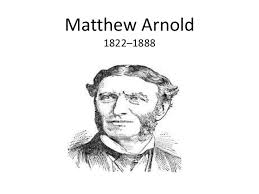Creep into thy narrow bed,
Creep, and let no more be said!
Vain thy onset! All stands fast.
Thou thyself must break at last.

Let the long contention cease!
Geese are swans, and swans are geese.
Let them have it how they will!
Thou art tired: best be still.
They out-talked thee, hissed thee, tore thee?
Better men fared thus before thee;
Fired their ringing shot and passed,
Hotly charged and sank at last.
Charge once more, then, and be dumb!
Let the victors, when they come,
When the forts of folly fall,
Find thy body by the wall!
Arnold advises his readers. He wants them to rise beyond the altercation, and as if it was the in the early hours of morning, and they were incredibly exhausted, “creep” into bed, he commands. The other implication of “creep” could be that the author is implying a need to surrender ourselves to the humiliation of giving up. But then Arnold questions, “Vain thy onset!”, meaning, Why not give up when triumph is impossible? “All stands fast” means that no one will budge an inch. We must “break at last,” but better to bend, to buckle under and tactically retreat, than break down entirely.
The call for the need to be proved right, does not trump the requirement for peace, conversely establishing our correctness. The “long contention” must cease even if that means we have to succumb to other people’s irrationality. The narrative portrayal of hissing and tearing brings about the verbal brutality of rational wits while implying that they’re better than the snakes or cats.
It might be irrational as to what their beliefs might be, and Arnold illustrates this with an example. They could claim “geese are swans” but they would never admit they are incorrect. He says, that the truth will reveal itself when the time would be right.
In the third stanza, Arnold warns us that the “better men” than ourselves have been in identical situations; more courageous men who have “fired their ringing shot” and still been “sunk”.
In the fourth and last stanza, Arnold cries out in irritation and annoyance, in a manner as if we had denied his advice and swore to continue, “Charge once more, then, and be dumb!” In other words, he meant, try to proceed to have one more try and then be quiet forever. The mentions of “forts of folly” and the “body by the wall” illustrate this battle as a siege, where the virtuous few confront the proud citadel of the many.
Arnold harks back at us, truth is so much more vital than being intellectual or influential; and the real champion is the one who has the subtle assurance to turn the other cheek.